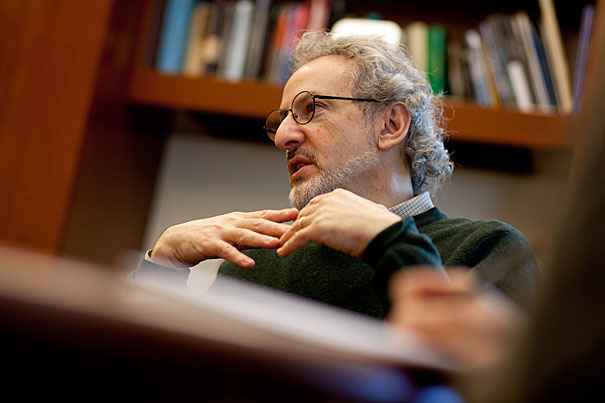
Donald E. Ingber’s most recent innovation is a technology for building a tiny, complex, three-dimensional model of the human lung. This breathing “lung-on-a-chip” mimics complicated human functions, providing critical information for diagnostic and therapeutic applications more reliably and at a fraction of the cost associated with traditional drug-testing methods.
Rose Lincoln/Harvard Staff Photographer
AIMBE inducts Ingber to College of Fellows
Wyss Institute founding director honored for pioneering efforts
The Wyss Institute for Biologically Inspired Engineering at Harvard University announced on Feb. 4 that its founding director, Donald E. Ingber, has been inducted into the American Institute for Medical and Biological Engineering’s College of Fellows on the basis of his major contributions to cell and tissue engineering, angiogenesis and cancer research, systems biology, and nanobiotechnology.
This distinction affirms Ingber’s pioneering efforts in the emerging field of biologically inspired engineering. He also holds the Judah Folkman Professorship of Vascular Biology at Harvard Medical School and Children’s Hospital Boston and is a professor of bioengineering at the Harvard School of Engineering and Applied Sciences.
As founding director of the Wyss Institute, Ingber is helping to advance the new field of biologically inspired engineering by leading a multifaceted effort to identify the mechanisms that living cells use to self-assemble into tissues and organs, and to apply these design principles to develop advanced materials and devices for applications in areas ranging from cancer and regenerative medicine to architecture and robotics.
Ingber’s most recent innovation is a technology for building a tiny, complex, three-dimensional model of the human lung. This breathing “lung-on-a-chip” mimics complicated human functions, providing critical information for diagnostic and therapeutic applications more reliably and at a fraction of the cost associated with traditional drug-testing methods.
Lung-on-a-chip was recently recognized as among last year’s most important research advances in biological and medical science by the Faculty of 1000 (F1000), a collaboration of more than 10,000 of the world’s leading scientists and clinicians. The technology was also named to Discover magazine’s list of the Top 100 stories of 2010.




